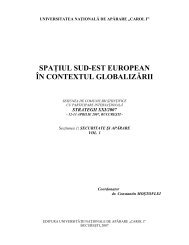Impact strategic nr.6-7 - Centrul de Studii Strategice de Apărare şi ...
Impact strategic nr.6-7 - Centrul de Studii Strategice de Apărare şi ...
Impact strategic nr.6-7 - Centrul de Studii Strategice de Apărare şi ...
- No tags were found...
You also want an ePaper? Increase the reach of your titles
YUMPU automatically turns print PDFs into web optimized ePapers that Google loves.
ACTUALITATEA POLITICO-MILITARĂ<br />
The Romania’s Armed Forces Professionalization<br />
in the Context of NATO Admission<br />
General PhD Mircea MUREŞAN,<br />
Deputy-Chief of the General Staff<br />
1. General consi<strong>de</strong>rations<br />
Nowadays world is in a completely different position<br />
than the one during the Cold War on types of threats<br />
on the national security, regional and global and on the<br />
geopolitical context of international relations. The Soviet<br />
Union disappearance together with the massive threat<br />
it was representing was replaced with a chaotic world<br />
marked on the one hand by the dominance of a sole super<br />
power and on the other hand by a burst of violence in different<br />
geographical areas. In addition, globalization, the<br />
information revolution, as a consequence of a real technological<br />
mutation and the effects of a more inter<strong>de</strong>pen<strong>de</strong>nt<br />
European construct raise questions of national i<strong>de</strong>ntity in<br />
new terms. In these conditions, military action losses its<br />
previous references: the threats against the national territory<br />
are less perceivable. Same thing happens with the<br />
confrontation between <strong>de</strong>veloped <strong>de</strong>mocratic countries.<br />
Moreover, war – in the historical dimension of the world<br />
and having a <strong>de</strong>vastating character due to the <strong>de</strong>stroying<br />
power of mo<strong>de</strong>rn weapons seems to give place to crisis.<br />
These have multiple forms and different intensity levels,<br />
sometimes without a clear i<strong>de</strong>ntified enemy. Therefore,<br />
the external interventions are increasing- imposing and<br />
peacekeeping operations, humanitarian operations, fighting<br />
against international terrorism – not often in coalitions<br />
or multinational organizations. The legitimity of these<br />
missions consists in the fact they are carried out with a<br />
UN agreement. Generally speaking, outsi<strong>de</strong> the country<br />
it is working for protecting and promoting the human<br />
rights. Therefore, it is obvious the need of passing from<br />
an army based on conscription to a professional one,<br />
able to handle the actual type of missions. The process of<br />
making professional armies is finished in some countries<br />
(U.S., England, France) and in some is in work (Germany,<br />
Belgium, and Netherlands).<br />
At present, according to the criteria referring to ways<br />
of recruiting military personnel, armies may be divi<strong>de</strong>d in<br />
the following categories: mass army (based on conscription,<br />
as a way of recruiting the larger part of soldiers);<br />
professional army (the whole army is recruited on a volunteer<br />
basis); mixed army (combines the two mentioned<br />
recruiting ways).<br />
The Romanian society as well as the army, as a<br />
part of it, confronts with all these external challenges.<br />
Moreover, some internal challenges are ad<strong>de</strong>d due to<br />
the complex process of reform and restructure of all the<br />
sectors. Romania and its armed force have connected to<br />
these requirements making efforts to answer properly to<br />
all these challenges.<br />
In this context, a serious challenge for the Romanian<br />
army represents the active involvement in carrying out<br />
some missions outsi<strong>de</strong> the national territory: imposing<br />
and keeping peace in different world areas; humanitarian<br />
missions; fighting against international terrorism. Our<br />
country’s responsibilities are increasing if we take into<br />
account Romania’s invitation to join NATO. Assuming<br />
this type of mission imposed an assimilation of norms,<br />
vales, principles and regulations referring to organization,<br />
training, recruiting. These are specific to the North-<br />
Atlantic Alliance and they had to be put in practice fast<br />
and efficiently by the Romania’s Armed Forces. For<br />
achieving them, there is a need of a profound, ongoing,<br />
multi-dimensional reform of the military body. An essential<br />
dimension of the reform is the human one and insi<strong>de</strong><br />
of it an important variable is represented by recruiting<br />
process of military personnel according to the transition<br />
from conscription to volunteer. The programmes we have<br />
achieved or we are achieving give us the right to assert<br />
we are on the good way.<br />
2. Determinations of professionalizing army<br />
This is a process by which an organization or institutions<br />
regulates and carries on following professional<br />
rules and by professional people. This concept means<br />
the ensemble of activities based on norms, principles<br />
and regulations specific to that field. In this respect, the<br />
professionalization of the army assumes a change system<br />
IMPACT STRATEGIC nr. 1-2/2003<br />
23



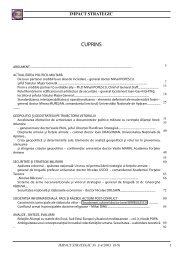

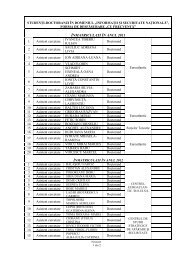
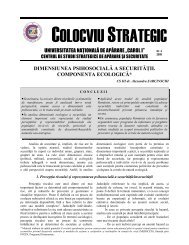
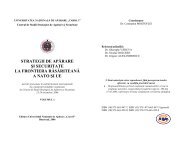
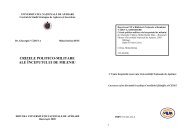


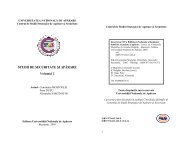
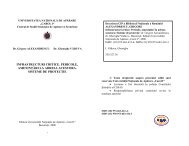
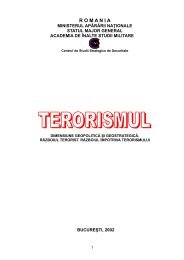
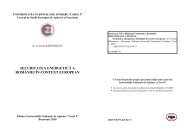
![„CAROL Nr 4 [29]/2008](https://img.yumpu.com/53801719/1/184x260/carol-nr-4-29-2008.jpg?quality=85)
